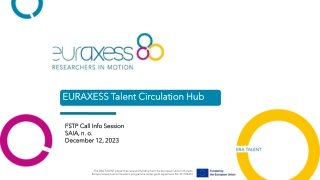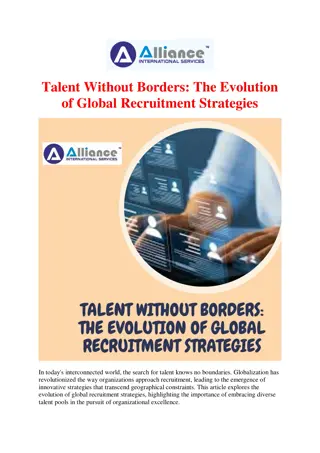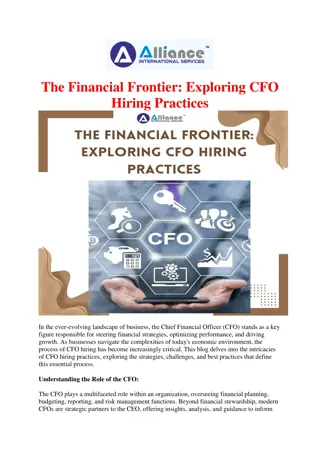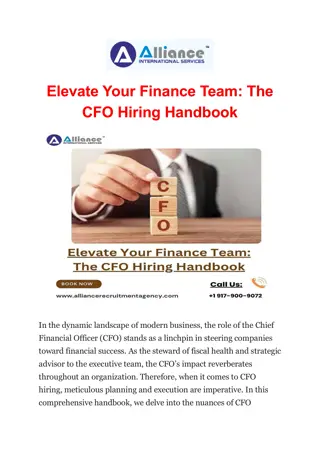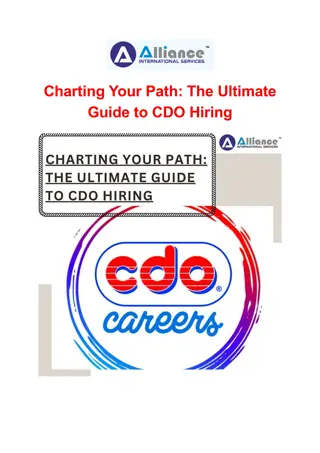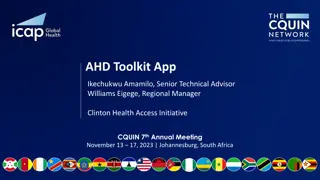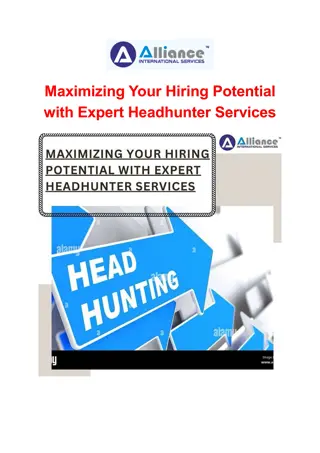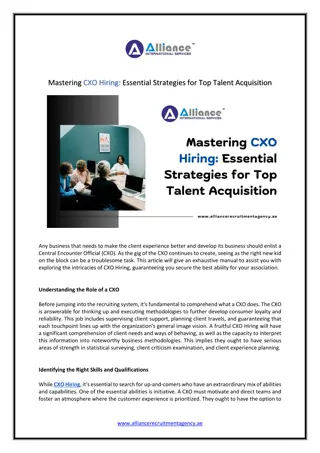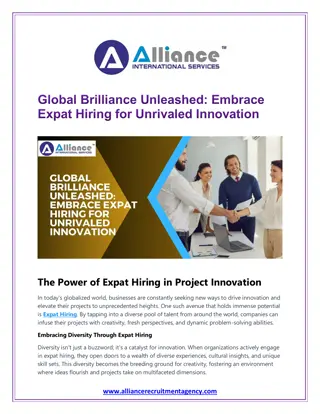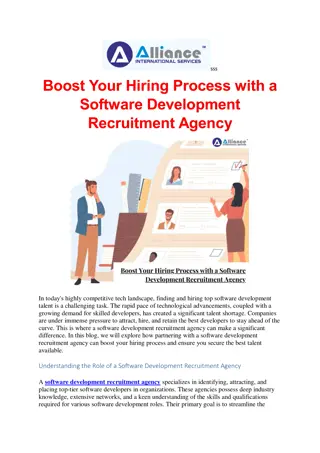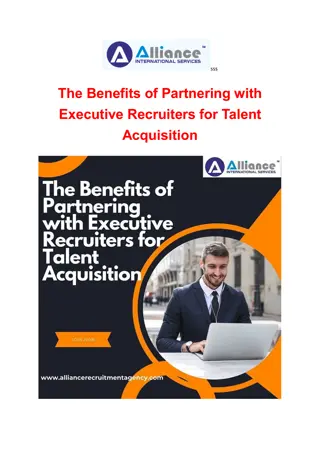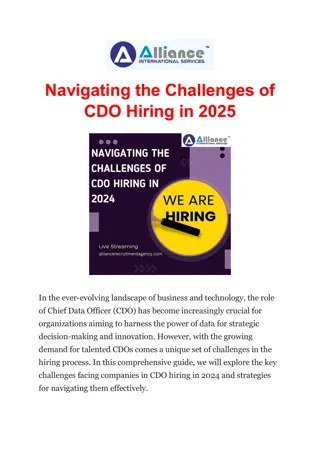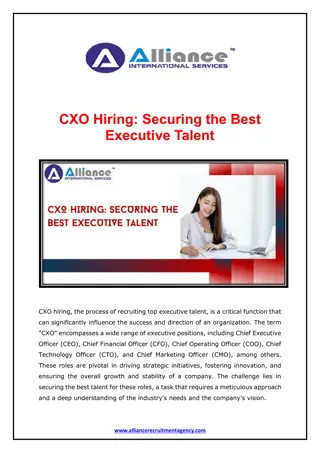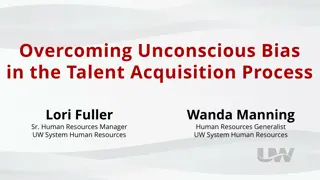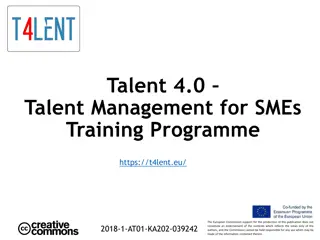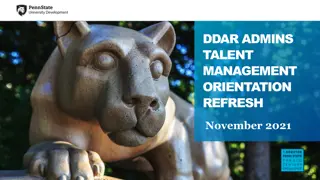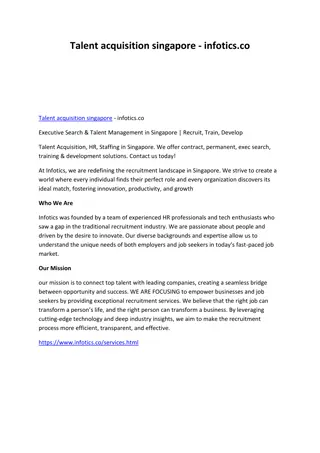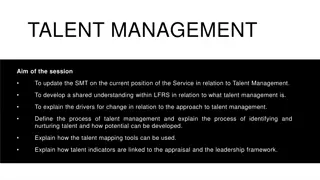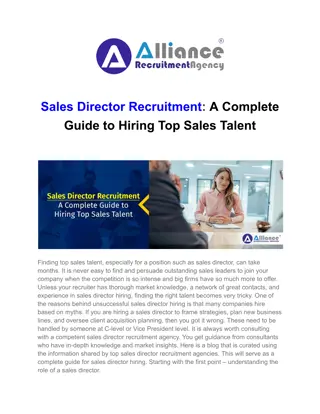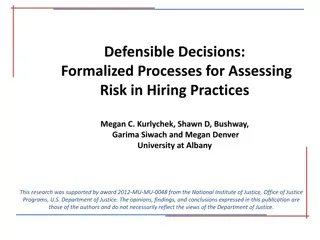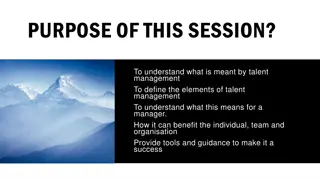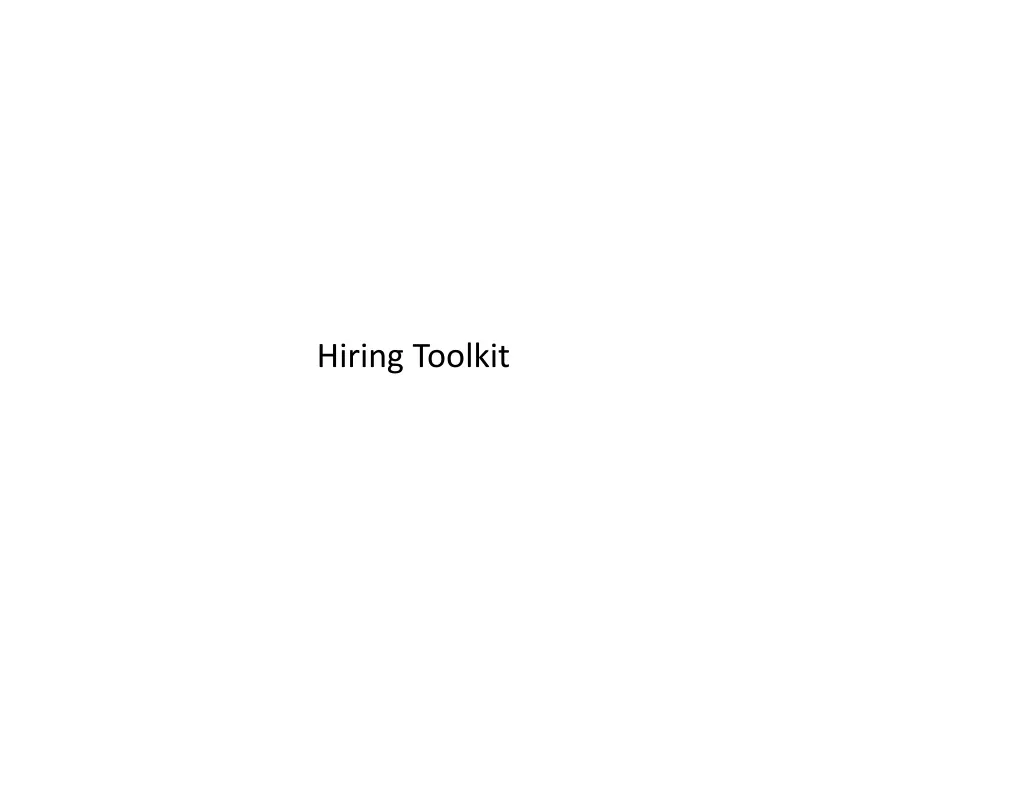
Effective Recruiting Strategies: Expand Candidate Pool & Enhance Inclusivity
Enhance your recruiting strategy by expanding the candidate pool and promoting inclusivity. Learn how to leverage networks, use inclusive language in job descriptions, structure interviews, and foster diversity. Utilize various tools and techniques to attract top talent and create a more inclusive hiring process.
Download Presentation

Please find below an Image/Link to download the presentation.
The content on the website is provided AS IS for your information and personal use only. It may not be sold, licensed, or shared on other websites without obtaining consent from the author. If you encounter any issues during the download, it is possible that the publisher has removed the file from their server.
You are allowed to download the files provided on this website for personal or commercial use, subject to the condition that they are used lawfully. All files are the property of their respective owners.
The content on the website is provided AS IS for your information and personal use only. It may not be sold, licensed, or shared on other websites without obtaining consent from the author.
E N D
Presentation Transcript
Recruiting Best Practices Strategy Expand the Funnel Tips Expand the Candidate Pool use your resources: When you hire a new colleague, ask them who in their network is high performing talent; keep a pipeline tracker and establish relationships with this talent so when a role becomes available, you ve already established a connection with them Proactively ask colleagues at your company for diverse referrals from underrepresented groups, add them to your tracker and establish relationships Find 1-2 diverse partnerships - post your open role job descriptions on their job boards; proactively review their resume books EACH PARTNERSHIP SHOULD HAVE A DEFINED ROI Campus hiring develop a list of ~5 target schools with which to establish deep relationships, including with relevant clubs on campus, while simultaneously using technologies such as Handshake or Ripplematch that enable your posted roles to reach potential student candidates from a wide range of academic institutions; consider if institutions from this second group should be considered target over time. Job Description - use inclusive and unbiased language: Overall: Job descriptions seeking general skills and competencies should yield more success than long lists of highly specific experiences Be mindful to use gender neutral language (yields 25% more qualified candidates and fills roles 14 days faster) Avoid: determined, decisive, competitive, dominant, perceptive, sociable, outgoing, fearless, exhaustive, manage, determine the, enforce, ideal applicant, killer instinct, work hard / play hard, competitive salary, assertive, driven by, superstar, expert, rockstar, guru, team player, liase, presentation skills Include: precise, outstanding, handle, commitment to learning, learn new things, future, trust, supportive, connected, sympathetic, loyal, dependable, accommodate, encourage, integrity, teammate, provides feedback, self-starter, fun, sense of humor, be heard, kind, enthusiastic, teach, partnership, groundbreaking, innovative, integration, creative, inspire change, inspired by, create something better, experienced, passionate about; including a growth-mindset phrase will fill the role 12% faster on average Use language that encourages rather than dissuades candidates who are uncertain of their qualifications, e.g., If you believe you could excel in this role, we encourage you to apply even if you re not sure you meet 100% of our ideal qualifications Be location agnostic if possible Textio is a good external vendor that helps make your JDs more inclusive Interview Preparation ensure there s structure: Establish clear criteria / competencies / must-have skillsto identify what you need for the role Have a diverse group of interviewers (varies in gender, ethnicity, seniority, thinking styles, ability to judge must have skills, and a peer colleague in an adjacent role the candidate would not report to) that can dedicate time and provide skill-based feedback Have each interviewer deep dive into 1-2 competencies to get a holistic view of the candidate strengths page 2 page 2 Public
Recruiting Best Practices Strategy Ways to be more inclusive during the interview process Interview Feedback & Assessment Candidate Selection Kick-off Meeting Interview Process Offer Question your first, instinctive response Host a kick-off call with the interview team hiring mgr discusses role & competency matrix & role of each interviewer, explicitly discuss desire to ensure a diverse slate, recruiter shares unconscious bias reminder Include a diverse candidate in the final round Assess a candidate immediately after their interview to avoid recency bias o Focus on the candidate experience/skills vs. personally identified info (name, education, background) to combat similarity bias favoring those with similarities to yours Avoid starting an interview with small talk, which may lead to confirmation bias only listening to what you want to hear to confirm a positive or negative bias. Instead, open with an outline of the interview structure or a relationship building question to make you both feel comfortable. For example, tell me about a defining moment, personal or work event that has shaped who you are today? Seek independent views separately Prior to candidate debrief meeting, avoid small group discussions on candidates /candidate feedback to avoid group think and ensure confidentiality of feedback Send a prep note to interview team prior to the kickoff call (see sample): Reminder on required vs nice to have skills Ask each interviewer to assess for a specific 1-2 skills/attributes Prioritize the identification of diverse talent early in search Debrief Conversation: o Focus on skill-based feedback necessary for the role and ensure it s supported by examples o Ask junior level to share feedback first o Avoid modifying the role s responsibilities to fit the more likeable candidate Hold search open to allow for diverse interview slates and creatively challenge any assumptions that diverse talent with the needed skills is not out there Ask the same job-relevant interview questions to each candidate to establish a level playing field and to ease calibration Suggest behavioral interviewing questions to properly assess skills. Avoid focus on fit Request interviewers do not share candidate feedback with each other in advance of their interviews (even if it s good feedback!) page 3 page 3 Public
Hiring Biases Potential biases to be aware of when interviewing candidates page 4 page 4 Public
Recruiting Best Practices Strategy Sample Competency Matrix Role Must-Have Requirements Comments 1. Intellectual Curiosity Candidate demonstrates an ability to be self-taught, excitement and pattern of learning new things, and strives for self-improvement & growth mindset Use of humble language, learning from mistakes and after-action reviews are included in daily activities Shares relevant examples of how they stay current with market trends Proactively asks curious questions, demonstrates a linkage from one interview to the next 2. Business Judgement / Critical & Analytical Thinking Skills Candidate demonstrates an ability to consider the relative importance of different drivers, weigh the alternatives and commit to the most appropriate action based on the specific information provided Demonstrated ability to think critically and tackle ambiguity with complex problems Can connect the dots and apply information from past experiences to make an insightful decision Structured approach to frame their answers and reverts back their structure when given new information by the interviewer Ability to form a vision for what they need to do to contribute to the bigger picture 3. Team Leader Proven ability to attract, build and effectively retain top talent in key strategic areas across the team Exudes the behaviors of someone who can act as a stress absorber for the team, has a clear vision and ability to help the team prioritize while improving collaboration and coordination across functions Fosters a team culture of openness, intellectual challenge/debate inclusion and mentors a diverse and inclusive team making those around them better Customer ready - investment excellence, credible and trusted with 4. Technical Candidate can accurately identify methodologies to solve relevant business challenges Demonstrated experience and passion in xx; shows either day 1 or future potential to be a strong performer in role responsibilities Specific examples are provided of how their career experiences has demonstrated subject expertise page 5 page 5 Public
Search Kick-Off Meeting Sample Prep Email to Interview Team Hi All, Thank you for agreeing to be involved in the interview process for the XXX role. Below is a summary of our recruiting process format, please review prior to our kickoff call on XX. Round 1: Initial screen Round 2: Technical and Behavioral Acumen Goal: assess the competency of specific skills necessary for the role; sample behavioral type questions can be found in our company bank question list (refer to proceeding slides) High Level Overview of the Role: Role for Interviewers: Goal: screen for basic culture and technical fit Interviewers: Recruiting Team & Hiring Manager Interviewer A B C D Role Competencies / Measures for Success (see attached) Skill A Skill B Skill C Skill D Final Round 4: Key Stakeholder Interviews Goal: final candidate assessment with top candidates Interviewers: xx Candidate Selection: Host a debrief meeting with all interviewers Have each interview share with the recruiting team candidate feedback in advance of the debrief Unbiased Hiring Best Practices: During the Interviews 1. Avoid starting with small talk, which may lead to confirmation bias only listening to what you want to hear to confirm a positive or negative bias. Instead, open with an outline of the interview structure or a relationship building question to make you both feel comfortable. For example, tell me about a defining moment, personal or work event that has shaped who you are today? Ask the same job-relevant interview questions to each candidate to establish a level playing field and to ease calibration During the Interviews 2. 1. 2. 3. Do not share candidate feedback with those who have not yet interviewed the candidate Assess candidate immediately after the interview to avoid recency bias Hold a debrief conversation with the recruiter (as moderator) and all interviewers: Share feedback to the moderator before the debrief Ensure feedback is supported with interview samples Ask the junior interviewers to share feedback first Interview Feedback & Assessment Candidates: Attached the candidate resumes in a batch A good ratio is 10 candidates : 1 hire Recruiting Team (if further questions arise): Lead Recruiter: xx Recruiting Coordinator: xx Thanks! XX Attachments: Job Description, skill criteria, candidate resumes page 6 page 6 Public
Interview Question Bank Sample Culture Value Questions Customer focused Describe the most rewarding experience you have had dealing with customers. Tell me about a time when you had to handle an unreasonable request from a customer. What did you do? Tell me about the most difficult customer experience that you have ever had to handle. What did you do and what was the outcome? Tell me about the most difficult customer interaction you ever had. What was the problem? How did you approach it? How did things turn out? Tell me about a situation in which you had to disagree or say no to a very valuable customer- what did you do? Tell me about a situation in which you had to go above and beyond for a customer? Collaborative Tell me about a work experience where you had to work closely with others. How did it go? How did you overcome any difficulties? Tell me about the toughest teams/groups you have had to work with. What made it difficult? What did you do? Describe a team project that you are particularly proud of. What did you accomplish? How did the team work together? Give me an example of a situation where you helped your teammate perform a particular task in which you had better knowledge on the subject? And vice versa? Give me an example of a time when you tried your best to work with someone different than you, but had difficulty. How did you resolve? What did you learn from that situation? Give me an example of a time when you were able to build motivation in your co-workers or teammates. Sometimes it can be difficult to work across functional boundaries. Tell me about a situation in which you had difficulty working with a functional area other than your own. What have you done in the past to improve/promote knowledge sharing in a team environment? What was the situation? What was the outcome? Confident and Resilient Give me an example of when you had to persevere through a challenging situation. Tell me about a time in which you had to remain positive and/ or optimistic when those around you were not. Can you describe a time when your work was criticized? What is your greatest failure, and what did you learn from it? What was the most difficult period in your life, and how did you deal with it? Describe a time when you didn't give up on an idea or position despite opposition from others. Give me an example of a time when you felt under pressure. - What was the situation? - What were you trying to achieve? - What did you do? - What was the result? Creative, Diverse thinkers Tell me about a situation in which you disagreed with your team or your co-workers. What did you do? What is your favorite book? Describe a time you thought "outside the box. What did you do? Why? Tell me about a problem that you ve solved in a unique or unusual way. What was the outcome? Were you happy or satisfied with it? Give me an example of when someone brought you a new idea that was odd or unusual. What did you do? Tell me about a time in which you took a differentiated approach to solve a problem. Humility / Self Awareness What has been a piece of constructive feedback you ve received and how are you addressing it? Tell me about a decision that you made that ended up being incorrect. - What drove it? - How did you handle it? - What would you do differently if you had to do again? Describe a situation in which you failed at something at work. What would you do differently if you had to do again? What is the typical situation when you make mistakes? What s one thing about your career that your proud of or would make you smile? What would you consider to be your greatest achievement in your professional work? Inclusive Tell me about a time in which you helped a co-worker. What about when a co-worker helped you? Tell me about an example when you learned from others. Tell me about a situation in which you asked for insights from others to achieve superior results (when you didn t need to)? Tell me about the most challenging piece of feedback that you had to give someone else or a peer. - What did you say? - How was it received? Have you received constructive feedback from a peer or co-worker (someone else besides your boss)? Tell me about the situation. Give me an example of when you have had to seek advice in solving a problem. - Who did you consult? - Why was there a need to? - Did you do what they suggested? page 7 page 7 Public
Interview Question Bank Sample Culture Value Questions Flexible and Adaptable Are you a person who likes to try new things or more comfortable with regular routines? Give an example. Describe a major change that occurred in a job that you held. How did you adapt to this change? Tell me about a situation in which you had to adjust to changes over which you had no control. How did you handle it? Tell me about a time that you had to adapt to a difficult situation. What do you do when priorities change quickly? Give one example of when this happened. Tell me about a recent stressful work assignment. What was going on? What made it particularly stressful? How did you get past it Integrity Give me an example when you spoke out about something you didn't feel was right. Tell me about a time you faced an ethical dilemma. Tell me about a time that you made a big mistake and did not realize it until after. What did you do? Give me an example of a time you did something wrong. How did you handle it? Tell me about the biggest work-related mistake you ever made. What happened? What did you do? How do you ensure you don t make the same mistake? Give me an example of an ethical decision you have had to make on the job. What factors did you consider in reaching this decision? Can you tell me about a situation where your analysis of a problem was deemed to be incorrect? What would you have done differently? Discuss a time when your integrity was challenged. How did you handle it? Meritocracy Ask candidate about the environments of his/her previous jobs. - What was the structure? - How many people? - Hierarchy? - How was work assigned? - How did the team interact or work together? - What did s/he like/not like about the work/environment? - What created efficiencies or lack thereof? List five words that describe your character Describe the difference between good and exceptional Tell me about a time in which you displayed excellence. Have you ever worked with a team member that didn t pull his/her own weight? What did you do? What have you done in the past year to develop your skills and abilities? Tell me about a situation when you went above and beyond the call of duty? Take Risks Give an example when you took a risk either at work or outside of work. Tell me about a decision you had to make with incomplete information. If resources or time were unconstrained, tell me what you wish you could have done differently. What is your greatest failure, and what did you learn from it? What was the most difficult period in your life, and how did you deal with it? Tell me about an example of when you had to go against the crowd and communicate an unpopular idea and were able to gain buy-in from your team? Tell me about when you had to make a difficult decision that others didn t agree with. Value our culture What do you like most about your company s culture? What characteristics do you want in your new company? Who is your most inspiring co-worker? What do you admire about them? What work environments from your past have you enjoyed most? The least enjoyable? What are you looking for in your coworkers and supervisors? Describe a time when your priorities didn't match a more senior level manager's vision. How did you handle the situation? What was the result? Why did/are you leave/leaving your last/current position? - Listen for what didn t work, probe hard here and get specifics. Tell me about your best manager/worst manager in the past. What did you like/dislike and why? If you had to choose one, would you consider yourself a big-picture person or a detail-oriented person? Why? page 8 page 8 Public
Interview Question Bank Sample Technical Questions Analytical Problem Solving In your last job, tell me about a project that was intellectually stimulating or challenging. Give me an example of a time when you demonstrated the ability to 'think outside the box.' - How did your idea differ than "traditional" ideas? - What was the result? Tell me about a situation where you had to solve a difficult problem. - What did you do? - What was your thought process? - What was the outcome? - What do you wish you had done differently? Tell me about a decision you had to make with incomplete information. - If resources were unconstrained, tell me what you wish you could have done differently. Tell me about a project that really tested your analytical abilities. Tell me about an assignment you worked on in which you had to amass a huge amount of data, and then analyze it. Have you ever been confronted with a problem which turned out to be very different or more complicated than you had first judged? What did you do? Can you tell me about a situation where your analysis of a problem was deemed to be incorrect? What would you have done differently? Tell me about a time when you were given an assignment, but you were not clear of how to go about it. - How did you tackle this situation? Tell me about a time when you had to analyze information and make a recommendation. - To whom did you make the recommendation? - What was your reasoning? - What kind of thought process did you go through? Why? - Was the recommendation accepted? If not, why? Attention to detail Give me an example of an assignment that you found difficult to finish. How did you go about it? How do you handle projects with short deadlines that require precise calculations and analysis? What is your approach? Give me an example of a time when you found errors in your work. What caused the errors? How did you correct your mistakes? When do you tend to make mistakes? Everyone makes mistakes... tell me about the last big mistake you make. Capability What have others told you that you do best? What are your key capabilities? What were the key measures of success in your previous positions? How did you perform against the expectations that were set? Can you give me three examples of work that you have done that is similar to the role we are considering you for? Press for specifics. Communication skills Please tell me about an experience when you had to speak up in order to be sure that other people knew what you thought or felt. Tell me about a time when you had to use your verbal skills in order to get a point across that was important to you. Describe a time when you were able to successfully communicate with another person, even when the person did not know or like you. Give an example of a time when you had to keep from speaking or not finish a task because you did not have enough time to come to a good decision. Describe the most significant written document, report or presentation you completed. Tell me about a time when you had to give someone difficult feedback. How did you handle it? What steps have you taken to improve your communication skills? Describe a situation in which you needed to use different communication styles to influence stakeholders with differing perspectives . Tell me about a time your communication skills were put to the test. Tell me about a difficult or sensitive situation that you had to deal with which required careful and extensive communication. Influencing others Can you tell me about a time when you had to convince others to take a course of action or do something that didn't work out as planned? - What did you do? Tell me about a situation in which you had to convince others to take a certain action. - What happened? - How did you influence them? Give an example of when you have to make a decision that others did not agree with. - What did you do? Teamwork How have you helped your manager to inspire positive vibes in your team? Tell us about when you had to deal with conflict within your team. - How did you help to resolve it? Tell us how you went about promoting both morale and work ethic in the teams you have been in? Give an example of when you have helped a team member that was underperforming. page 9 page 9 Public
Interview Question Bank Sample Technical Questions Work ethic/motivation Tell me about a time when you had to go above and beyond the call of duty in order to get a job done. Give two examples of things you ve done in previous jobs that demonstrate your willingness to work hard. Describe a time when you set an important goal and the success in reaching it. What important goals have you achieved in the past year? Describe a project or idea that was implemented primarily because of your efforts. - What was your role? - What was the outcome? Give an example of an important goal that you set in the past. Tell about your success in reaching it. Would you describe yourself as resilient? If so, please give some recent examples. What motivates you to go the extra mile on a project or job? Give me an example of when you demonstrated initiative you set out to learn something or do something without anyone prompting or reminding you. Describe a time recently when you put in more time and effort than was required or expected. Tell me about a time when you did not meet a deadline or live up to a commitment. Versatility Tell me about a time when you had to adapt to different types of people. How are you different today than you were two years ago? Describe a time when you felt it was necessary to modify or change your actions in order to respond to the needs of another person. Multi-tasking/priority setting How do you make sure you get all of your work done and do not miss important deadlines? How do you keep yourself organized and ensure deadlines are executed? Tell me about a time in which you knew you just could not get all the work done and were going to miss getting information to a customer. - What did you do? You have several projects that are all "high priority." How do you manage them all? Give me an example of a time when you felt excessive demands was placed on you. - How did you handle the situation? Describe how you would handle a situation if you were required to finish multiple tasks by the end of the day, and there was no conceivable way that you could finish them. Initiative / Pro-activeness Resourcefulness Describe a project or idea (not necessarily your own) that was implemented primarily because of your efforts. - What was your role? - What was the outcome? Describe a situation in which you recognized a potential problem as an opportunity. - What did you do? - What was the result? - What do you wish you had done differently? Tell me about a project you initiated. - What did you do? - Why? - What was the outcome? - Were you happy with the result? Tell me about a time when your initiative caused a change to occur. How have you added value to your job? What are you most proud of in your current role? Tell me about a recent idea that you had for improving a work process? - What did you do to implement? - How did it work out? In hindsight, how could you have improved your performance over the last year in your current role? What steps do you take when there is an immediate decision to be made, but without having all the data available? - If resources were unconstrained, tell me what you wish you could have done differently. When deciding how to organize your work, how do you assess what tasks need to be given priority? Give me an example (like systems, methodologies, standards etc.) of something that was changed because of your suggestions? - How did it benefit the group/club/team? Tell me about a time when you found a better way of doing something, which proved to be an improvement on the existing system. Tell me about a time when you were given an assignment, but you were not clear of how to go about it. How did you tackle this situation page 10 page 10 Public

